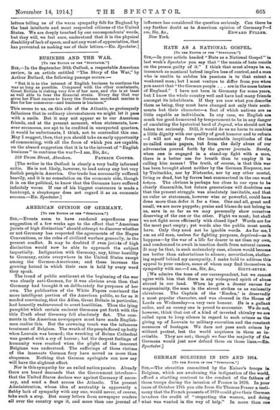HATE AS A NATIONAL GOSPEL.
[To rsz EDITOR Ol THE " SPECTATOR"] SIR,—In your article headed " Hate as a National Gospel" in last week's Spectator you say that " the mania of hate recoils on the person guilty of it." I think that must always be so, inasmuch as maniacal hatred implies loss of control, and a man who is unable to subdue his passions is to that extent a weakened man ; but I must venture to differ from you when you assert that " the German people . . . are in the mass haters of England." I have not been in Germany for some years, but I know the whole country well and have had many friends amongst its inhabitants. If they are now what you describe them as being, they must have changed not only their senti- ments but their character—a feat of which nations are as little capable as individuals. In any case, we English are much too good-humoured by temperament to be in any danger of emulating the hysterical bard of Jugend, who should not be taken too seriously. Still, it would do us no harm to combine a little dignity with our quality of good humour and to refrain —I will not say from the lamentable ineptitudes of the so-called comic papers, but from the daily abuse of our adversaries poured forth by the graver journals. Surely, when one is engaged in a stand-up fight with a man, there is a better use for breath than to employ it in calling him names 1 The truth, of course, is that this war has been brought about neither by the German Emperor, nor by Treitschke, nor by Nietzsche, nor by any other mortal, living or dead, but by forces best summarized in the one word apcircn. The obvious is perhaps too close to our eyes to be clearly discernible, but future generations will doubtless see that the present struggle was absolutely inevitable, and that no ruler or statesman, however wise or powerful, could have done more than defer it for a time. One and all, great and small, we are mere puppets; praise and blame do not belong to us, save in so far as we may personally show ourselves deserving of the one or the other. Fight we must; but shall we not fight more efficiently with closed lips P Words are for the most part empty ; yet words also the public must needs have. Only they need not be ignoble words. As for me, I am an old man, useless for fighting purposes, deprived—as it happens—by the war of a life far dearer to me than my own, and condemned to await in inaction death from natural causes. It may be that, in such melancholy case, silence would become me better than exhortations to silence; nevertheless, shelter- ing myself behind my anonymity, I make bold to address this appeal to your readers, some of whom may find themselves in
sympathy with me.—I am, Sir, &o., SIXTY-SEVEN.
[We admire the tone of our correspondent, but we cannot agree with him that there is any widespread spirit of abuse abroad in our land. When he gets a decent excuse for magnanimity, the man in the street strikes us as eminently chivalrous. The Captain of the 'Emden,' is deservedly a most popular character, and was cheered in the House of Lords on Wednesday—a very rare honour. He is a gallant sailor, and an enemy one is proud to encounter. We do not, however, think that out of a kind of inverted chivalry we are called upon to keep silence in regard to such crimes as the giving up of Louvain to military execution and the constant massacre of hostages. We dare not pass such crimes by without protest, lest the world acquiesce in them as in- evitable. They are not; though we fear the majority of the Germans would just now defend them on those lines.—En. Spectator.]






































 Previous page
Previous page